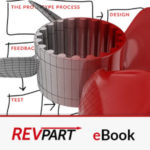It’s never too early — or too late — to focus on your career growth as an engineer. Whether you’re in the beginning stages of your tenure with a company, or maintaining a position as one of the senior, most experienced members of a team of engineers, you can always benefit professionally (and personally) from taking a step back and examining where you see the next phase of your career taking you.
While financial benefits will always be among the chief reasons to make an effort to seek promotion, expand your role, or move to another organization, a conscious effort to grow your career can also yield the following gains:
• Strengthening your company: When you make improvements to yourself with the goal of career growth, you contribute to a stronger, more stable organization — one that can better support you as you support it.
• Contribution to industry in general: Outsiders often talk of the downslide of manufacturing and engineering. Young or old, by taking an active role in your career, you make for a better and stronger overall field — one that will continue to attract the best and brightest.
What are some career tips that can help you improve your own position, as well as that of your company and the broader industry? Read on to learn more for each phase of your career: beginning, middle and late.
Career Tips for Beginning Engineers
Respect your own knowledge: Remember, your company hired you for a reason. Not only do you have the requisite knowledge of your field, as a younger engineer, you offer a unique perspective on problem-solving, and you are likely more familiar with newer technologies that can aid your company. Don’t be afraid to speak up and share your point of view with colleagues.
It’s not too early for the future: As you go through your day-to-day experiences as a junior engineer, stay aware of potential indicators that can shape the future of your career. What do you like to do? Where are areas that you find difficult? What would you like to improve? Do you find yourself enjoying working with people better than numbers? Questions like these can uncover often-overlooked factors that make it much easier to plot the course of your career in a couple of years.
Don’t limit yourself: Dovetailing with the above point, be sure not to stay boxed into one or two areas at your company, even as you examine what it is you do and don’t like about your current function. Many organizations offer “rotations,” where engineers have the opportunity to see exactly what other departments work on. While rotations present a huge benefit to teams working together, they can also help you get a firsthand look at other areas of interest, like systems engineering or sales engineering.
Seek a mentor: For all the benefit you bring to your company (as mentioned in our first point), you still have a lot to learn. A mentor at your company is invaluable not only in the practical matters of your role, but in learning how an engineering career progresses in the real world.
Career Tips for Mid-Career Engineers

Look back and look forward: By now, you’ve had enough time on the job to really reflect on the makeup of your career so far. Examining what you do and don’t like isn’t just for beginning engineers — thinking back on those questions can help you decide what’s next at this critical juncture. Maybe you’re thinking about moving into management. Maybe you’d like to double down on your technical knowledge to move up, in or lead a team. Maybe you’d like to transfer what you already know to another area that’s always interested you.
Draft a plan: Whether you’re looking to make that move to another area, or just want to keep moving up the ladder, it’s important to have a practical, detailed, step-by-step plan to get there. It’ll help you stay focused, and, more importantly (in terms of actually making it happen), it’s key to have a concrete methodology in place to share with your supervisor as you discuss your goals. It’s the nuts and bolts of what you intend to do next in your career — something all engineers understand.
Learn more: Once you’ve decided where you see your career going, it’s time to look outward and see what new skills or knowledge you can gain to give yourself a boost. Could you learn how to be more efficient with CAD software? Are there new technologies or machines that would be useful for you to know? Would Six Sigma practices help you (and your company)? Be better prepared to be indispensable in your new role by learning something new.
Career Tips for Late-Career Engineers
There’s always room to learn — and offer — more: We just mentioned Six Sigma, the philosophy of continuous improvement. Under Six Sigma, there is no perfect product or process, but the goal is to examine every step of the way to strive for that perfection. It’s helpful to look at your own career the same way. Even after 30 or 40 years on the job, there’s always more that you can learn and room to improve — which can lead to more ways for you to contribute to the success of your career and your company.

Offer your services as a mentor: Our advice to young engineers is to seek a mentor. You can make that search easier by offering your experience and expertise. You’ll be seen as a leader and an influential member of your organization — perfect qualifications for making that jump to a department head or manager — and it’s quite likely that you may learn a thing or two yourself.
What’s next? Even if you’re on the verge of retirement — or retired — your career doesn’t strictly have to be over. In an industry landscape that’s still — and may always be — in need of engineers, your experience and knowledge are invaluable to organizations. You can continue to share it on your own terms either pro bono, or as an engineering consultant. Both are great ways to contribute to the industry while enjoying your well-earned retirement time.
The intention to improve your career is a key first step in doing so — and these tips can help usher you from that intent onto the career path you want.



